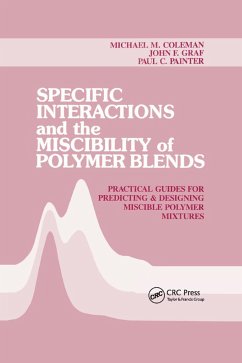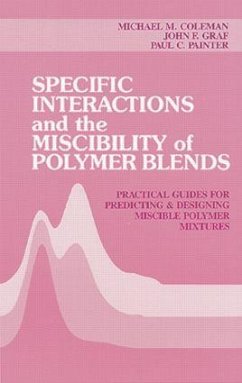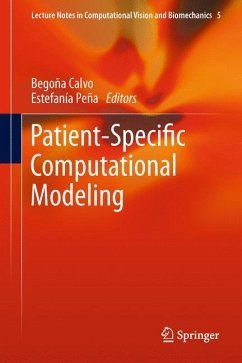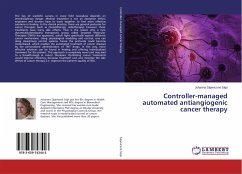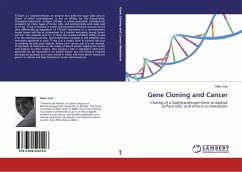
Gebundenes Buch
Site-specific Cancer Nanotheranostics
A Microenvironment-responsive Approach
Herausgeber: Pathak, Yashwant V.; L. Dhas, Namdev; K. Patel, Jayvadan
Versandkostenfrei!
Versandfertig in 1-2 Wochen

PAYBACK Punkte
74 °P sammeln!




Provides an overview of tumor microenvironment, the challenges and opportunities in developing stimuli-responsive and site-specific delivery nanoplatforms, and their related strategies for cancer treatment as well as toxicological and regulatory aspects. This illustrates their industrial applicability and commercialization prospects.
Dr. Yashwant Pathak completed his Ph.D. in Pharmaceutical Technology from India and EMBA and MS in Conflict Management from Sullivan University, USA. He is the Associate Dean for the Faculty Affairs College of Pharmacy, University of South Florida. Tampa, Florida. With extensive experience in academia and industry, he has over 150 research publications, abstracts, chapters and reviews, 7 books in Nanotechnology and drug delivery systems, 6 in Nutraceuticals and several books in cultural studies. His areas of research include drug delivery systems, nanotechnology applications for pharmaceuticals and Nutraceuticals. He has traveled extensively to over 80 countries to network with scientific experts and is actively involved with many Pharmacy colleges in different countries. Dr. Jayvadan Patel is a Formulation Scientist at Aavis Pharmaceuticals, USA. He has more than 26 years of research, academic, and industry experience, and has published more than 270 research and review papers in international and national Journals. He has co-authored 20 books and contributed 116 book chapters in a book published by well-reputed publishers. His papers have been cited more than 5000 times, with more than 25 papers getting more than 50 citations each. He has a 35 h-index and 121 i10-index for his credit. He has guided 106 M. Pharm students and mentored 46 Ph.D. scholars. He is already decorated with a dozen awards and prizes, both national and international. He is the recipient of the very prestigious "AICTE-Visvesvaraya Best Teachers Award-2020" by the All India Council for Technical Education, Government of India and the APTI-young pharmacy teacher award (2014) by the Association of Pharmaceutical Teachers of India. He is a reviewer of more than 75 and an editorial board member of 20 reputed scientific Journals. He has completed 12 industry and government-sponsored research projects. Dr. Namdev Dhas, is currently working as an Assistant Professor in Department of Pharmaceutics, Manipal College of Pharmaceutical Sciences, Manipal Academy of Higher Education (MAHE), Manipal, Udupi, Karnataka, India. He has received his PhD from Institute of Pharmacy, Nirma University, Ahmedabad, Gujarat in the year 2021. His area of research includes material science and engineering, multimodal therapeutic platforms, inorganic nanocomposites for cancer therapy. The main focus is synthesized different metal-based nanoplatforms and how their properties will affect the efficiency of therapy and diagnosis. He has published 31 publications in the form of several research and review articles in International journals. Out of 31 publications, two articles published in the journal (Coordination Chemistry Reviews) with an impact factor of 24.883, six articles are in 11.467 impact factor (Journal of Controlled Release) and one article in 10.723 (Carbohydrate Polymers). As of now, he has bagged with more than 180 cumulative impact factor by publishing the articles in several national and International Journals. His scientific articles have been cited more than 500 times. Recently, he received a research grant from SRG-SERB in August 2022. He was recently awarded as "Excellent Researcher in Pharmaceutical Science" by Indian Drug Manufacturing Association (IDMA) and Healthcopeia in July, 2022. He also received "Young Researcher Award-2020" organized by Institute of Scholars, Bangalore, India. Dr. Vipul P. Patel is currently working as a Director and Professor at SRES' Sanjivani College of Pharmaceutical Education and Research (An Autonomous Institute), Kopargaon, Maharashtra. He has 22 years of Teaching & Research experience in the field of Pharmaceutical Technology & Biotechnology. He has guided more than 60 M. Pharm students and 10 Ph. D students. He has received more than 6.0 crore rupees grant from various funding agency like AICTE, DBT, GUJCOST, RGSTC and DDU-GKY (Govt of India) for research, Institutional development and rural skill development purposes. He has published more than 70 research publications in various reputed national and international journals and 04 book chapters in international publishing books with 01 book authored. He has a 13 h-index and 18 i10-index with more than 500 citations for published papers to his credit He had published 02 Indian Patents in the area of anticancer drug discovery and tablet. He had completed more than 12 lakhs rupees of consultancy projects in the area of in-vitro cytotoxicity cell lines. He had also completed 01 industry project sponsored by SciTech Specialties Pvt, Ltd., Sinnar, Nashik, Maharashtra on Effervescent Tablet. He is professional members of various pharmaceutical associations including IPA, GSPC, Pharmacy Council of India (as an elected Inspector), Fellow in Institute Chemist India etc. He had also received BEST TEACHER AWARD 2020 (InSc-Bangalore, approved by Ministry of HRD; New Delhi). His major core area of research is Novel Drug Delivery system for Probiotics, anticancer drug discovery & cytotoxicity and Bioavailability enhancement.
Produktdetails
- Verlag: CRC Press
- Seitenzahl: 390
- Erscheinungstermin: 19. Oktober 2023
- Englisch
- Abmessung: 260mm x 183mm x 25mm
- Gewicht: 926g
- ISBN-13: 9781032434827
- ISBN-10: 1032434821
- Artikelnr.: 68102607
Herstellerkennzeichnung
Libri GmbH
Europaallee 1
36244 Bad Hersfeld
gpsr@libri.de
Für dieses Produkt wurde noch keine Bewertung abgegeben. Wir würden uns sehr freuen, wenn du die erste Bewertung schreibst!
Eine Bewertung schreiben
Eine Bewertung schreiben
Andere Kunden interessierten sich für





